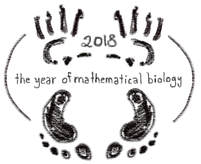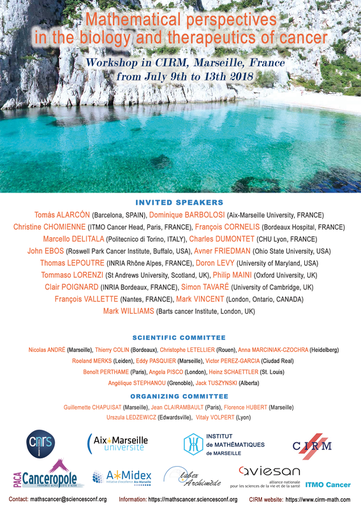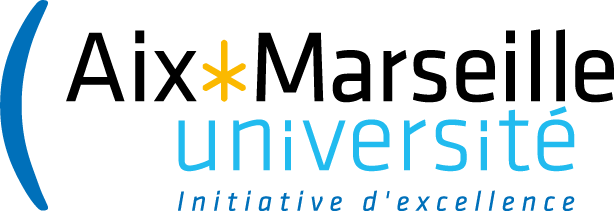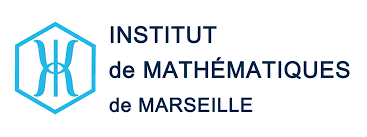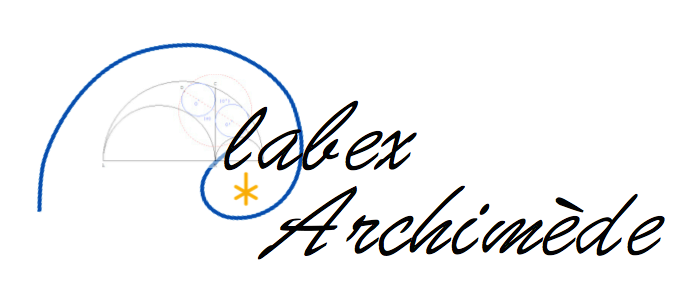Mathematical Perspectives in the Biology and Therapeutics of Cancer
Perspectives mathématiques en biologie et thérapie du cancer
9 – 13 July, 2018
Wednesday sessions will emphasize clinical aspects from the physician point of view and promote some successful interdisciplinary collaborations. There will be especially an ITMO session, a poster session,…
|
Scientific Committee
Comité scientifique Nicolas Andre (Hôpital de la timone, Marseille) |
Organizing Committee
Comité d’organisation Guillemette Chapuisat (Aix-Marseille Université) |
|
This workshop aims to bring together specialists and young researchers from different mathematical backgrounds (modeling, numerical simulations and analysis), working in the field of oncology and from the world of oncology and oncopharmacology. This workshop follows other workshops successfully organized at CIRM in 2009, 2011 and 2015. The interest of bringing closer the world of mathematicians, oncologists and biologists is getting more and more accepted and is a very promising way of setting trans-disciplinary collaborations. Important progress has been achieved in the discipline of onco-mathematics in the last decade. We will look at a variety of topics, among which:
|
Ce congrès a pour objectif de réunir des spécialistes et des jeunes chercheurs de cultures différentes autour de la modélisation, de la simulation et de l’analyse mathématique en médecine et plus particulièrement en biologie du cancer. Il fait suite à deux écoles et une conférence organisées avec succès au CIRM en 2009, 2011 et 2015.
Mathématiciens, médecins, pharmaciens et biologistes ont intensifié ces dernières années leurs collaborations et d’importants progrès ont été accomplis dans les dix dernières années. Cette rencontre sera une opportunité pour des chercheurs d’horizons variés du monde entier de faire le point sur les avancées dans des domaines comme:
|
- Tomás Alarcón (Centre de Recerca Matemàtica, Barcelona) Heterogeneity in epigenetic regulatory systems: Epigenetic plasticity in aging and cancer
- Dominique Barbolosi (Aix-Marseille Université) Is there again a place for the phenomenological models in medicine?
- Marcello Delitala (Istituto Politecnico di Torino) Combination therapies and drug resistance in heterogeneous tumoral populations (pdf) – VIDEO –
- Charles Dumontet (CHU Lyon) Resistance to anticancer agents : a multifactorial problem (pdf)
- John Ebos (Roswell Park Cancer Buffalo, New York) Modeling metastasis after tumor microenvironment inhibition: An in vivo/in silico approach
- Avner Friedmann (Ohio State University) Clinical trials with combination therapy for cancer: how to design them effectively (pdf)
- Thomas Lepoutre (INRIA Rhône Alpes) Impact of the immune system on chronic myeloid leukemia
- Doron Levy (University of Maryland) Modeling the chemotherapy-induced selection of drug-resistant traits during tumor growth – VIDEO –
- Tommaso Lorenzi (St Andrews University, Scotland) Partial differential equation models of evolutionary and spatial dynamics of cancer cell populations
- Philip Maini (Oxford University) Modelling tumour angiogenesis – VIDEO –
- Victor Manuel Pérez- García (Universidad de Castilla-La Mancha) Morphological MRI-based features derived from biologically-inspired mathematical models predict glioblastoma survival
- Clair Poignard (INRIA Bordeaux) Numerical Workflow for Electroporation Ablation of Liver Tumors
- Mark Vincent (London Regional Cancer Centre, Cancer Care Ontario) A-Theory: Why atavism must now be taken seriously as an explanation for cancer (pdf)
- Marc Williams (Barts Cancer Centre, QMU London) Quantifying evolution in human cancers with genomics
- Pedro Ballester (Cancer Research Centre of Marseille) Precision and recall oncology: combining multiple gene mutations for improved identification of drug-sensitive tumours (pdf) – VIDEO –
- Sébastien Benzekry (INRIA Sud-Ouest) Optimization of sequential administration of bevacizumab plus cytotoxics in non-small cell lung cancer by combining in vivo experiments and mathematical modeling – VIDEO –
- Patrick Brest (Institute of Research on Cancer and Aging of Nice) Role of tumor microenvironment in tumor progression (pdf) – VIDEO –
- Christine Chomienne (ITMO Cancer Aviesan and Research and Innovation department INCA, Paris) Where Math Meet Cancer (pdf) – VIDEO –
- Mathilde Badoual (CNRS, Université Paris Denis Diderot) Modeling the origin of gliomas
- Annabelle Ballesta (University of Warwick) P-glycoprotein activity is dependent on sex,circadian timing and feeding conditions –Implications for pharmacokinetics modeling (pdf)
- Juan Calvo (Unversidad de Granada) Estimating compartment size for stochastic and hybrid simulations of structured populations (pdf)
- Cécile Carrère (Sorbonne Université) Dynamical programming of a chemotherapy preventing resistance for in vitro heterogeneous tumours (pdf)
- Clément Draghi (Institut Inter-regional de Cancerologie, Le Mans) MooveCare: a web-mediated follow-up based on weekly self-reported symptoms. From chaos theory to clinical practices (pdf)
- Geneviève Fourel (INSERM, ENS Lyon) Why we should care about repeat sequences and not only genes, in cancer
- Sara Hamis (Swansea University) Trojan-horse cancer drugs: An in silico investigation into hypoxia-activated prodrugs
- Martin Hoffmann (ITEM, Regensburg) Genetic alterations driving metastatic colony formation are acquired outside of the primary tumour in melanoma
- Niklas Kolbe (University of Mainz) Modeling and simulation of EMT and tumor cell heterogeneity in cancer invasion (pdf)
- Mihály Koltai (Institut Curie, Paris) Using perturbation data for ensemble modeling to infer vulnerabilities in colon cancer cells (pdf)
- Odelaisy León-Triana (University of Castilla-La Mancha) Brain metastasis: Growth laws and imaging biomarkers
- Christophe Letellier ( Université de Rouen) Parameter identification of a model for prostate cancer treated by intermittent therapy (pdf)
- Nicolas Meunier (Université Paris Descartes) A minimal multi-scale approach for cell migration modelisation
- Cecilia Pola (Universidad de Cantabria) Analysing Optimal Control Problems for the Gompertz Model in Chemotherapy (pdf)
- Camille Pouchol (Sorbonne Université) Efficient chemotherapy in spite of drug resistance: optimal strategy and robustness (pdf)
- Peter Raskhov (Institute of Mathematics and Informatics, Bulgaria) Multistability and hormesis in the dual phosphorylation-dephosphorylation cycle (pdf)
- Maria Pia Saccomani (University of Padova) The relevance of identifiability in model-based oncological studies. A new method to calculate all the possible parameter solutions of a tumor model
- Magdalena Strauss (University of Cambridge) Bayesian hierarchical context-dependent clustering for multi-omics (pan-) cancer data (pdf)
- David Taieb (Aix-Marseille Université) Mathematical modeling of disease dynamics in SDHB- and SDHD-related paraganglioma: Further step in understanding hereditary tumor differences and future therapeutic strategies – VIDEO –
- Rémi Tesson (Aix-Marseille Université) Cell migration modeling of the impact of microtubules dynamics on cell migration
- Cristina Vaghi (INRIA Sud-Ouest Bordeaux) Improving the efficacy of antibody nanoconjugates in cancer therapy with mathematical modeling
- Stefano Avanzini (University of Edinburgh) Cancer Recurrence Times from a Branching Process Model
- Federica Bubba (University Paris Sorbonne) Density-dependent Keller-Segel models for cell culture pattern formation
- David Cheek (Edinburgh University) Mutation frequencies in a birth-death branching process
- Martina Conte (Basque Center for Applied Mathematics) Glioma Proliferation, Spread and Therapy: a Multiscale Approach
- Chloé Dominici (IBDM, Aix-Marseille Université) tba
- Clément Draghi (Institut Rafael, Levallois-Perret) Towards an individualized spatial modeling for tumor growth
- Antonio Fernández Romero (Universidad de Sevilla) Glioblastoma evolution model in relation to vasculature
- Karina García (Center of Molecular Immunology, Havana) Mathematical modeling of the evolution of heterogeneous tumors interacting with Effector and Regulatory T cells
- Jérémy Guillot (IBDM, Aix-Marseille Université)
- Ghassen Haddad (Institut Pasteur de Tunis) An optimal control model of a heterogeneous tumor treatment in the context of stem cell cancer
- Sara Hamis (Swansea University) Chemotherapeutic drug resistance in cancer: Insights from a multiscale in silico study
- Roger Hill (University of Warwick) Optimizing circadian drug infusion schedules towards personalized cancer chronotherapy (pdf)
- Martin Hoffmann ( Fraunhofer ITEM, Regensburg) Stochastic system identification without an a priori chosen kinetic model—exploring feasible cell regulation with piecewiselinear functions
- Maciej Leszczyński (Lodz University of Technology) On the Role of Pharmacometrics in Optimal Control of Models for Cancer Therapies
- Michael Nicholson (University of Edinburg) tba
- Ana Osojnik (University of Oxford) Systematic analysis of a bifurcating model of tumour-immune interactions
- Julián Pérez Beteta (Universidad de Castilla-La Mancha) Quantifying the complexity of the spacing between surfaces: Applications to brain tumors
- Pirmin Schlicke (Technical University Munich) An extended model for the growth and the size distribution of metastases including therapy methods
- Laure Talarmain (MRC Cancer Unit, University of Cambridge) Identifying drugging strategies using evolutionary principles in lymphoma mouse model


